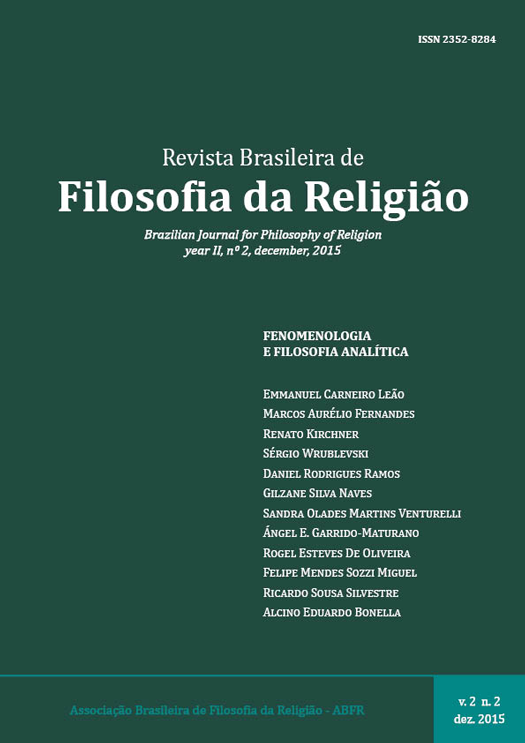Sobre a formalização lógica do argumento ontológico de Anselmo
DOI:
https://doi.org/10.26512/2358-82842015e17382Palavras-chave:
Formalização em filosofia. Argumentos teístas. Argumento ontológico. Argumento de Anselmo. Adams.Resumo
O tema geral deste artigo é a questão da formalização em filosofia; de uma maneira mais específica, ele trata da questão da formalização de argumentos em filosofia analítica da religião. Um argumento em particular ”“ o argumento ontológico de Anselmo encontrado no capítulo II do seu Proslógio ”“ e uma tentativa específica de formaliza-lo ”“ a formalização de Robert Adams encontrada em seu artigo “The Logical Structure of Anselm’s Arguments”, publicado no The Philosophical Review em 1971 ”“ são tomados como estudos de caso. O objetivo do artigo é analisar criticamente a formalização de Adams com o propósito de lançar alguma luz nas seguintes questões: Quais são as virtudes de se analisar formalmente argumentos e as contribuições de tal empreitada para o debate acerca do argumento de Anselmo? Que lições o trabalho de Adams pode nos dar sobre os perigos e limitações da formalização em filosofia? Essas virtudes e perigos nos ensinam algo sobre análise de argumentos em geral?
Referências
ADAMS, R. The Logical Structure of Anselm’s Arguments. The Philosophical Review, 1971,
:28-54.
ANSELM. Tr. M. Charlesworth. Notre Dame: University of Notre Dame Press, 1965.
CARNAP, R. Logical Foundations of Probability. Chicago: University of Chicago Press, 1950.
ENGEL, P. Formal Methods in Philosophy. In: Proceedings of the 6th European Congress of
Analytic Philosophy, (eds.) T. Czarnecki et al. London: College Publications, 2010.
ENGEL, P. Formal Methods in Philosophy: Shooting Right without Collateral Damage. In: The
Analytic Way. Proceedings of the 6th European Congress of Analytic Philosophy, (eds.) T. Czarnecki,
K. Kijania-Placek, O. Poller e J. Wolenski. London: College Publications, 2010.
GÖDEL, K. (1995) Kurt Gödel: Collected Works, vol. 3. Oxford: Oxford University Press, 1995.
HANSSON, S. Formalization in Philosophy. The Bulletin of Symbolic Logic 6: 162-175, 2000.
HORSTEN, L.; DOUVEN, I. Formal Methods in the Philosophy of Science. StudiaLogica 89:
-162, 2008.
KLIMA, Gyula (2000) Saint Anselm’s Proof: A Problem of Reference, Intentional Identity and
Mutual Understanding. In: Ghita Holmström-Hintikka (ed.), Medieval Philosophy and Modern
Times,Dordrecht: Kluwer, 2000, p. 69-87.
MATTHEWS, G. “The Ontological Argument.” In: The Blackwell Guide to the Philosophy of
Religion, (ed.) William Mann,Oxford: Blackwell Publishing, 2005, p. 81-102.
OPPENHEIMER, P. and ZALTA, E. On the Logic of the Ontological Argument. In: Philosophical
Perspectives 5: The Philosophy of Religion, (ed.) James Tomblin. Atascadero: Ridgview
Press, 1991.
PLANTINGA, A. The Nature of Necessity. Oxford: Oxford University Press, 1974.
ROWE, W. Philosophy of Religion: An Introduction. 4th edition. Belmont: Wadsworth, 2006.
SOBEL, J. Logic and Theism. New York: Cambridge University Press, 2004.

